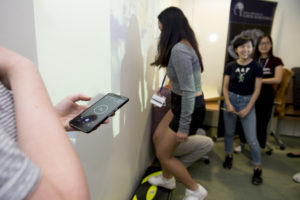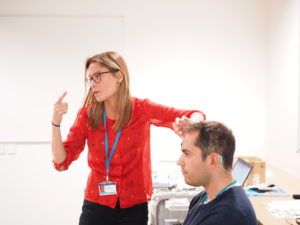 The NIHR Oxford Biomedical Research Centre has welcomed students attending the 58th London International Youth Science Forum, a two-week residential event that attracts more than 500 of the world’s leading young scientists from more than 75 countries.
The NIHR Oxford Biomedical Research Centre has welcomed students attending the 58th London International Youth Science Forum, a two-week residential event that attracts more than 500 of the world’s leading young scientists from more than 75 countries.
Twenty-five students attended the Nuffield Department of Clinical Neuroscience, based at the John Radcliffe Hospital on Thursday 3 August.
Dr Nicholas Irving introduced the students to the neuroscience research department and gave a historical talk about 17th century neuroanatomy pioneer Thomas Willis and how our current research and state-of-the-art technology was derived from his work.
The students’ programme consisted of four sessions:
There was an interactive session on breathlessness with Dr Sarah Finnegan and Lucy Marlow, who are both part of the Breathe Oxford project, where the students were asked to exercise with a peg on their nose and a straw in their mouth and rate how breathless they felt.
The students were given a tour of the neuropathology labs with Dr Olaf Ansorge, Lead Clinical Neuropathologist in Oxford and Director of the Thomas Willis Oxford Brain Collection. They had the opportunity to look at real human brains from the Oxford Brain Bank with neuropathology professor Margaret Esiri. They looked at dissected sections under the microscope, and were shown advanced scanning techniques
Dr Desiree Spronk and Dr Martyn Ezra (pictured left) talked about their research into subarachnoid haemorrhage, a kind of stroke, demonstrated an EEG and explained different MRIs.
The final session was a truly magical experience; Dr Matthew Tompkins, from the University of Oxford’s Department of Experimental Psychology, works on using behavioural visual experiments, based on sleight of hand magic tricks, to investigate inattentional blindness and illusory perceptions.
One of the students, 18-year-old Jeninna Cruz from Australia, is pictured above doing the breathlessness test. She said: “My passion and interest is within the medicine field, especially neuroscience and cardiothoracic region of the human body.
“The whole day was eye-opening and enjoyable. My favourite part would have to be the session where we looked at different parts of the human brain. It was such an enlightening experience.”
